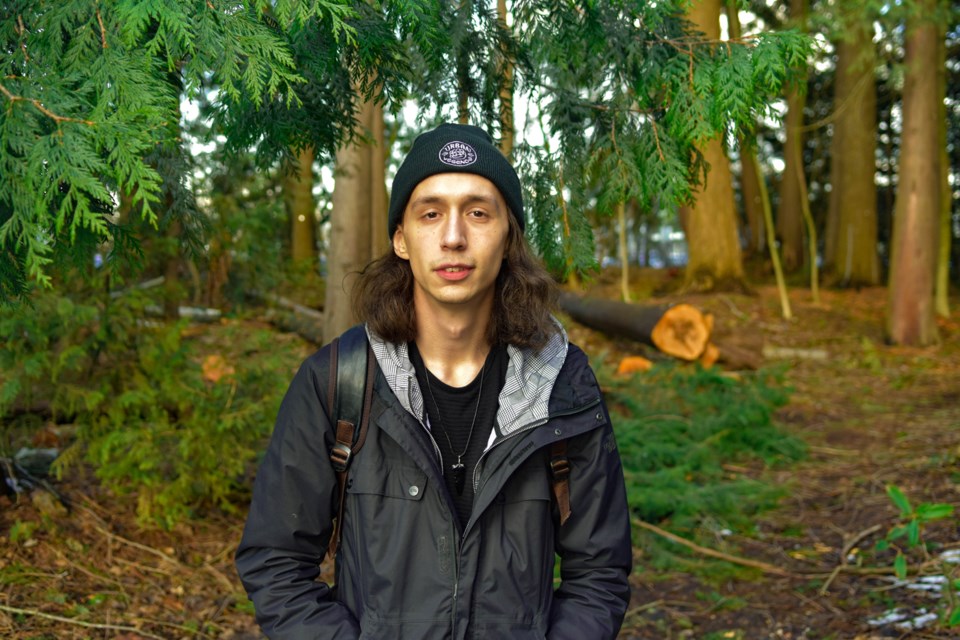For Tawahum Bige, words aren’t written just to be read on the page. They’re written to be shared in the way words have been shared since humans began to tell stories: aloud, in spoken form.
Bige, who’s finishing up his bachelor’s degree in creative writing at Kwantlen Polytechnic University, is bringing his expertise in literary performance to LitFest New West. He’s working alongside Kwantlen compatriot Chelsea Franz to offer up You’re a Writer But Also a Performer, running at 10 a.m. April 27 at the Anvil Centre.
“I’ve been really focusing on poetry, both for the page and spoken. Something that really interests me is hybridizing the two,” Bige said.
He noted conventional wisdom has it that poetry either reads well or speaks well, but not necessarily both at the same time. What he’s working to do is write poetry that “performs as well as it reads.”
“I’ve learned that, one, you can do it for sure, and two, you can’t always do it,” he said with a laugh. “I’m an Aries, and my stubbornness still wants to try.”
Bige said performance is an aspect that’s often overlooked by writers, pointing out there are many excellent writers who haven’t worked on their reading voice. That, he says, is a missed opportunity for writers who want to get their work in front of an audience.
“Whether it’s a public performance or podcasting, there’s just so many different mediums,” he said. “I’m finding a lot of folks are moving towards audio as a way of ingesting literature.”
It makes sense to Bige, who is Lutselk’e Dene and Plains Cree, that writing is grounded in oral storytelling.
“At its root foundation, writing comes from oral practice,” he said, noting his own interest in storytelling has been nurtured by his Indigenous communities.
Bige noted both Dene and Cree cultures are rooted in oral traditions in which the ceremonial aspect of performance is central.
“Storytelling and spoken word is a form of medicine, and it’s a form of ceremony,” he said. “Folks can get to a very deep place of healing and medicine through that ceremony very quickly.”
A highlight of his literary career so far has been attending the first Indigenous Storytelling and Spoken Word Intensive at the Banff Centre, where seven out of nine participants were Dene.
“It was pretty amazing to be surrounded by so many Dene storytellers and spoken word artists,” he said.
Another transformative experience for Bige was taking part in the Urban Native Youth Association’s Indigenuity program – where he and another poet worked with dancers and musicians to create an hour-and-a-half-long multidisciplinary spoken word theatre production for the 2017 Talking Stick Festival.
“That was an incredible experience,” Bige said. “It was one of my very first memorized and polished performances.”
It also opened Bige’s eyes to the myriad possibilities for spoken word art.
“Multimedia and interdisciplinary art is especially where I feel like the industry is moving, and where the art is moving,” he said. “Any art form, it can only go so far on its own. Poetry, you can take it as far as you can as just poetry, but as soon as you start mixing it with other forms – music, visuals, maybe even acting – that’s where it starts to really come to life.”
For their LitFest workshop, Bige and Franz welcome participants of all backgrounds and experience levels.
Bige will bring his Dene and Cree lens to the workshop, but he stressed it’s not strictly an “Indigenous” storytelling workshop. His co-presenter, Franz, is South Asian and comes from a different storytelling background, with a focus on mindfulness.
Bige and Franz will meet each participant wherever they are in their personal literary journey.
“Whether you’re reading your short stories that are coming out in a collection or an anthology, or you’re straight up doing spoken-word poetry … there’s a way to strengthen their performance aspect of it,” Bige said. “It’s not about moulding somebody into the perfect performer or the archetypal performer. It’s about building on strengths that are already present in the way they speak, in their own unique voices.”
To register for Bige’s workshop and to see the full LitFest schedule, see www.litfestnewwest.com.



